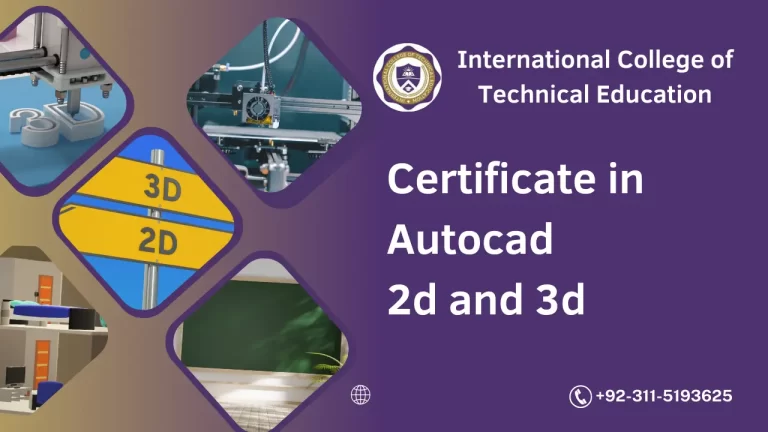Civil surveying is a critical part of the construction and engineering industries. Surveyors play a pivotal role in providing accurate data that influences the planning, design, and construction of infrastructure projects such as roads, bridges, buildings, and land development.
The Civil Surveyor Course in Attock is designed to provide students with the knowledge and practical skills necessary to become proficient civil surveyors. This course covers the core concepts of land surveying, data collection, measurement techniques, and the use of modern surveying tools and equipment. The curriculum focuses on both traditional and advanced surveying methods, preparing students to handle the challenges faced in the construction and infrastructure development industries.
Through a combination of theoretical learning and hands-on practical training, students will gain the skills needed to support civil engineering projects, ensure accurate data collection, and contribute to the successful execution of large-scale infrastructure projects.
Course Overview
The Civil Surveyor Course in Attock offers comprehensive training in various surveying techniques used in civil engineering and construction. The course encompasses the use of modern surveying equipment such as Total Stations, GPS systems, and Leveling Instruments, and also introduces students to software tools for data processing and mapping.
The course emphasizes practical experience, with students having the opportunity to participate in fieldwork and real-life surveying projects. By the end of the program, students will be equipped to perform essential surveying tasks, collaborate with engineers, and provide reliable data that is crucial for construction and land development projects.
Study Units
The course is structured into key units that cover the core competencies required to work as a civil surveyor. Below is an overview of the study units:
- Introduction to Civil Surveying:
- Overview of civil surveying and its importance in construction and infrastructure projects.
- Introduction to the tools and equipment used in surveying.
- Surveying Techniques and Methods:
- Understanding measurement techniques: distance, elevation, and angles.
- Types of surveys: boundary surveys, topographic surveys, and construction surveys.
- Surveying Instruments and Equipment:
- Introduction to traditional and modern surveying instruments: levels, total stations, GPS, and theodolites.
- Proper handling and calibration of surveying equipment.
- Land Measurement and Data Collection:
- Techniques for measuring land and plotting boundaries.
- Collecting data for construction projects and land development.
- Creating and interpreting survey maps and drawings.
- Topographical and Construction Surveys:
- Conducting topographical surveys to understand the physical features of land.
- Conducting construction surveys for layout and alignment of roads, buildings, and other structures.
- Survey Data Analysis and Mapping Software:
- Using surveying software to process data and generate maps.
- Introduction to CAD (Computer-Aided Design) for survey data representation.
- Legal and Ethical Aspects of Surveying:
- Understanding land ownership, boundary disputes, and surveyor responsibilities.
- Ethical considerations and adherence to local regulations.
- Fieldwork and Practical Training:
- Hands-on experience in field surveying projects.
- Supervised field exercises using real-world surveying equipment.
Learning Outcomes
Upon completing the Civil Surveyor Course in Attock, students will be able to:
- Understand the core principles of civil surveying and its role in construction and engineering.
- Use a variety of surveying instruments and equipment, including total stations, levels, and GPS systems.
- Conduct land and boundary surveys with accuracy.
- Perform topographical surveys and create detailed survey maps.
- Analyze and process survey data using mapping and CAD software.
- Collaborate effectively with engineers, architects, and construction teams.
- Apply legal and ethical standards in surveying practices.
Course Benefits
The Civil Surveyor Course in Attock offers numerous advantages:
- Comprehensive Skill Development: Learn both theoretical concepts and practical surveying skills needed to succeed in the field.
- Hands-on Experience: Participate in field surveys and gain real-world experience with advanced equipment and tools.
- Industry-Relevant Training: The course covers the latest technologies and software used in modern surveying practices, ensuring that students are prepared for the current industry standards.
- Job Opportunities: There is a growing demand for skilled civil surveyors in the construction, infrastructure, and land development industries, offering numerous career opportunities.
- Career Growth: Civil surveying is a specialized field with opportunities for professional growth, higher salaries, and advancement into roles such as senior surveyor, project manager, or even business owner.
- Flexibility: The course provides a blend of classroom learning and practical, on-site training, allowing students to gain comprehensive knowledge while also refining their skills in real-world environments.
Who is This Course For?
The Civil Surveyor Course in Attock is suitable for a variety of individuals:
- Beginners: Anyone interested in entering the civil engineering or construction fields can benefit from this foundational course.
- Current Construction Workers or Engineers: Professionals already working in construction who wish to expand their skills and take on surveying roles.
- Graduates of Engineering or Architecture: Those with a background in engineering or architecture can enhance their qualifications by learning the surveying skills essential for large-scale projects.
- Entrepreneurs: Individuals who want to start their own surveying business or construction company.
- Career Changers: Those looking to transition into the civil surveying field from another profession.
Future Progression for This Course
Upon completing the Civil Surveyor Course in Attock, there are multiple career progression paths and further educational opportunities for students:
- Surveyor Technician: Begin working as a surveyor technician in construction and infrastructure projects, handling tasks such as land measurement, topographical surveys, and construction layout.
- Field Surveyor: Work on-site performing field surveys, collaborating with engineers and architects to gather data for projects.
- Senior Surveyor or Survey Manager: With experience, take on leadership roles overseeing a team of surveyors or managing surveying projects.
- Project Manager: Progress into management positions, overseeing the planning, execution, and monitoring of large-scale civil engineering projects.
- Surveying Business Owner: Start your own surveying company or consultancy, providing services to construction companies, developers, or government agencies.
- Advanced Certifications and Specializations: Pursue further certifications or qualifications in areas like geodesy, land development, or geographic information systems (GIS).
- Engineering Roles: With additional education, transition into higher-level engineering roles, such as civil engineering, land development, or infrastructure planning.
Moreover, as construction and land development continue to grow, the demand for skilled civil surveyors will remain high, offering stability and long-term job prospects.
The Civil Surveyor Course in Attock is a highly valuable program for those interested in pursuing a career in construction, land development, and civil engineering. With a focus on both practical skills and theoretical knowledge, this course ensures that students are ready to contribute to the success of large-scale infrastructure projects.







